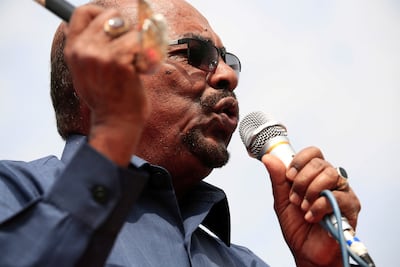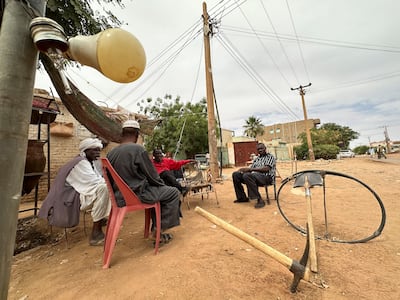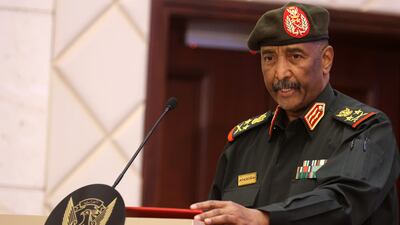Sudan's military leader Gen Abdel Fattah Al Burhan is a combat-tested soldier whose reputation for battlefield acumen and valour are not matched by his political skills, Sudanese analysts told The National.
Gen Al Burhan's desperate search for allies and his pursuit of a popular base to fulfil his political ambitions are mainly responsible for the ruinous three-month war between the army and the paramilitary Rapid Support Forces, led by his one-time ally and deputy Gen Mohamed Dagalo, the analysts said.
The 63-year-old army chief, who burst on to the political scene after the 2019 fall of dictator Omar Al Bashir, professes to be fighting to protect Sudan and shepherd the country towards democratic rule.
Instead, regardless of who fired the first shot on April 15, the untold misery the conflict has inflicted on the vast, impoverished Afro-Arab nation is certain to earn Gen Al Burhan an unenviable place in the history books.
Thousands of civilians have been killed and at least 2.5 million displaced, while private property and state assets worth billions of dollars have been destroyed.
A major humanitarian crisis has emerged as a result, with 25 million people – more than half the population – now in need of aid.

“Al Burhan tried to orchestrate circumstances that make him the man of the hour,” said Samy Saeed, the head of the Sudan programme at a European-based think tank.
“But his own political greed and ambitions made him vulnerable to pressure, mainly from Islamists loyal to Al Bashir, to push aside the RSF.”
The roots of the current conflict may go back to Gen Al Burhan's missteps in 2019 as well as his more recent alliance with militants after he and Gen Dagalo jointly staged a coup in 2021 that derailed Sudan's democratic transition under a civilian-led government.
Analysts said the army chief looked the other way when thousands of RSF fighters entered Khartoum, ostensibly to protect Al Bashir's regime from a popular uprising.
In a bold act of opportunism, the RSF instead took part in Al Bashir's removal from power by the military in April 2019.
The heavily armed and combat-seasoned RSF fighters then stayed on instead of leaving as expected, deploying throughout the capital in a thinly veiled challenge to the supremacy of the army.

Gen Al Burhan's tolerance of their menacing presence in Khartoum, analysts say, was primarily motivated by his wish to counter the influence and popularity of a pro-democracy movement that strengthened its role in ending Al Bashir's 29-year-old regime, determined to eventually force the military out of politics.
The leeway given to the RSF may have also been because of the poor state of an army fatigued from fighting in Sudan's seemingly endless civil wars, weakened by inadequate resources and fractured by the constant meddling of Al Bashir, who filled its ranks with Islamist loyalists.
Gen Al Burhan allowed the RSF to independently procure arms abroad, hire foreign military advisers, build vast economic interests outside state channels and court regional powerhouses and international players.
The RSF then launched its own military industry and considered building its own air force.
“He is not political and does not have a vision or a good understanding of how to run a country,” said Osman Al Mirghany, a prominent Sudanese analyst and editor in chief of the Khartoum daily Al Tayar.
“He is known for his bravery under fire and as an officer who happily spent the best part of his years of service in war zones, but his clumsy and frequent shifting of his alliances betrayed his lack of political expertise.”

Mr Al Mirghany also cited Gen Al Burhan's failure to form a government after the 2021 coup as further evidence of his limited political skills. Sudan remains without a government until the present day.
The RSF, for its part, carved a place for itself as a somewhat indispensable force.
It has, over the years, fought battles that the army was incapable or unwilling to undertake in remote parts of Sudan like the regions of South Kordofan, Darfur and Blue Nile, where rebels have for years taken up arms against the government.
The two generals began to drift apart months after the 2021 coup, which Gen Al Burhan marketed as necessary to spare Sudan from civil war, when in fact it was timed to prevent a civilian replacing him as head of state under a power-sharing deal between the military and the pro-democracy movement.
In a series of public comments, Gen Dagalo accused Gen Al Burhan and his associates in the military of clinging to power.
He also sought to distance himself from the coup, which he said served as gateway for Al Bashir loyalists to make a political comeback.
Gen Dagalo was not wrong or exaggerating when he made these accusations, the analysts said.

Soon after the 2021 coup, Gen Al Burhan suspended a state commission responsible for dismantling Al Bashir's administration, which had a near monopoly on big business, the civil service, NGOs and private universities.
He has also recalled army officers who had been pensioned off over their links to the old regime, approved the reinstatement of senior bureaucrats known to be loyal to Al Bashir, and freed funds and assets belonging to Islamists.
The spark between the army and the RSF, in theory at least, came from an internationally backed deal on Sudan's future that Al Burhan reluctantly agreed to last December but which was warmly embraced by Gen Dagalo.
The deal provided for the army to quit politics, the RSF to be integrated into the armed forces and for a civilian prime minister to take the helm for 24 months until elections are held.
In the following protracted negotiations to finalise the deal, Gen Al Burhan was adamant that the RSF integration should be completed within a period of six months.
The RSF balked, saying it was happy to integrate but over 10 years and only as part of wider reforms of the army and security services.
The war that followed was initially believed to be over this row, but it soon became clear that what Sudan was contending with was two power-hungry generals ready to fight to the bitter end to rule Sudan.
“Al Burhan was pushed by his Islamist allies to take an uncompromising stand on RSF integration. They thought the army can crush the RSF so that they can return to power,” said Rasha Awad, a Sudanese analyst known to be close to the country's traditional political parties, and the editor-in-chief of the online newspaper Al Taghyier.
“Now that the RSF has proved to be a formidable battlefield foe, Al Burhan's chances of leading a traditional military dictatorship have nearly vanished and the Islamists are even starting to blame him for the army's failures,” she said.
“Even some of his regional backers are thought to be having second thoughts about him.
“Al Burhan had a good opportunity to be remembered as a historical national leader had he taken the right decisions and agreed to wider reforms in the military and security agencies and not just entirely focus on a hurried assimilation of the RSF.”


